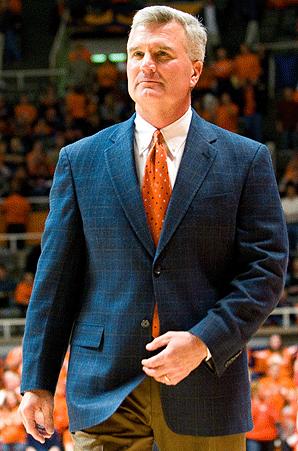
Illinois' Bruce Weber example of how good is no longer good enough
Good is not good enough in college sports anymore. Close gets you fired. Being a nice guy and following the rules buys you, at most, an extra year. College sports look more and more like pro sports, with multimillion-dollar salaries, pro-style arenas and win-yesterday mentalities. Schools used to take pride in having programs, not just teams -- a team's success varied, but you had to think twice before dismantling your program. Now this year's team needs to win.
Weber has been a good coach at Illinois. It doesn't seem that way now because this year's team has completely collapsed. But look at his Big Ten records through the years: 13-3, 15-1, 11-5, 9-7, 5-13, 11-7, 10-8, 9-9, 6-12.
That is a conference winning percentage of 58 percent. Lon Kruger won 58 percent of his Big Ten games at Illinois and landed an NBA head coaching job. Lou Henson won 57 percent of his Big Ten games at Illinois, got the Illini in trouble with the NCAA, and still lasted 21 years.
I'll admit that Weber's numbers are skewed because of his early success with Bill Self's players, most notably Deron Williams. Fair enough. But Weber still had to coach those teams, and he did a magnificent job with them.
Time and job pressure have gotten to Weber and the last few weeks have been uncomfortable for everybody. After a tough home loss to Purdue on Feb. 15, Weber made one of the most honest statements you will ever hear from a coach. Some coaches speak candidly about their players' flaws, and a few will admit to a tactical mistake, but very few cop to an emotional weakness.
And Weber said this:
"The sad thing about the whole thing, and I guess it's my fault, instead of creating toughness and developing a team, I coached not to lose all year," Weber said. "And that's really sad, to be honest."
In another world, another culture, that kind of admission would make him a sympathetic figure. In college basketball, there is a word for what Weber did: #%$*#!
Weber sounded like he was giving up, and his team played like it the next game. The Illini lost to Nebraska by 23 points, which is almost impossible. There were times this year when I didn't think Nebraska would score 23 points.
Weber has clarified and apologized and tried to keep fighting. But the elephant in the room has stomped on his team. Any argument to keep him has vanished.
He will leave with enough what-ifs to last the rest of his life. What if star Eric Gordon had kept his commitment to go to Illinois instead of switching to Indiana? Gordon was entitled to change his mind. But Weber went 5-13 in the Big Ten in Weber's one year in Bloomington. With Gordon, he could have made the NCAA tournament that year.
What if the refs had allowed James Augustine to play in the 2005 national title game against North Carolina? Augustine, the team's only true big man and a key cog in the offense, fouled out in nine minutes. If Augustine played 30 minutes and Illinois won the national championship would Weber be safe today?
What if freshman Jereme Richmond had not turned pro last summer? Richmond went undrafted. He would have made this Illinois team a lot more explosive.
Richmond's departure may have been the death blow, but you could see Weber's firing coming for three years. And here is why: The Big Ten, like the SEC in football, has been stocking up on big-name coaches. Michigan State's Tom Izzo is, of course, one of the best in the country. Ohio State has become a huge national player under Thad Matta. Minnesota hired a national-title winning coach, Tubby Smith. Michigan hired John Beilein, considered one of the great minds in the game by other coaches and the best pure coach in the school's history. Indiana hired Tom Crean, who took Marquette to the Final Four. Wisconsin's Bo Ryan has taken that program where nobody imagined it could go.
Well, they all have to face each other. And that means that good coaches were going to get fired. It was inevitable. Weber will be next, and it makes you wonder how long Smith can last at Minnesota. Smith did a good job this year after his best player, Trevor Mbakwe, was lost for the season because of an injury. But at some point, Minnesota's new athletic director won't care that Smith was a splashy hire. He will expect Big Ten championships.
It has become increasingly clear: Schools and coaches work together, but they are not really in this together. The money has gotten too big. Trust is gone. Winning is too important. Alumni and fans use the best stretch in a team's history as a baseline; the new coach needs to do at least that well to survive.
This will just get worse, too -- more like the pros, with every passing year. I once told a major-college coach I would like to see him, or one of his colleagues, sign a contract for, say, $500,000 a year -- a lot of money, but way below market value -- with one stipulation: If the coach got fired, the school owed him an enormous lump sum. That way, the coach could show he was serious about staying at one school, and that he didn't need to be filthy rich. And the school would give him security.
The coach dismissed my idea in roughly 0.04 seconds.
"If they want to fire you," he said, "they'll fire you. It doesn't matter how much you make."
Bruce Weber is about to get fired. He will survive and Illinois will survive. But it would have been nice to see them survive together.




